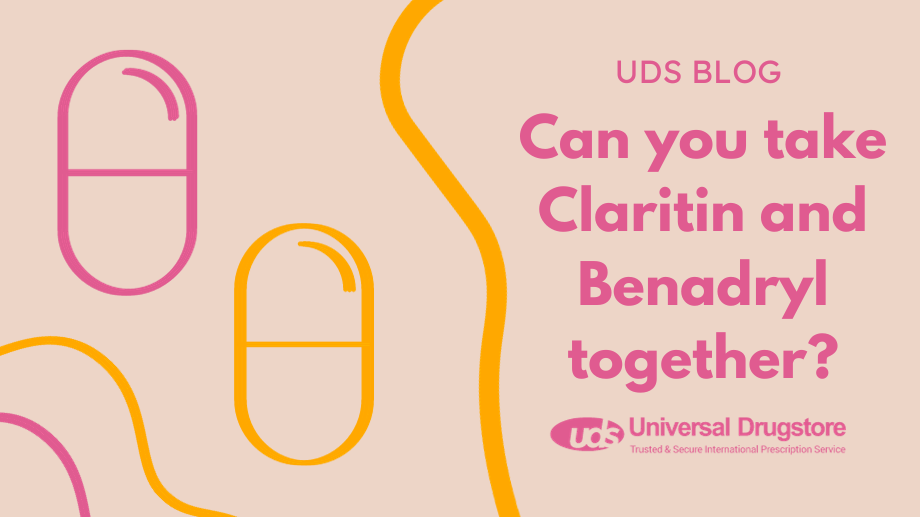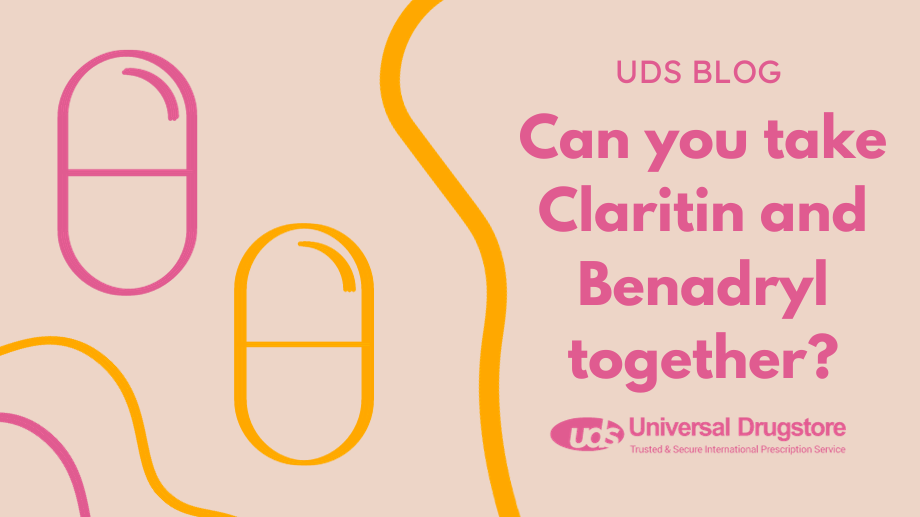Can I take Claritin and Benadryl together?

In 2021, an estimated 81 million people in the United States were diagnosed with seasonal allergic rhinitis (hay fever). This includes about 67 million (26%) adults and 14 million (19%) children. Many allergy sufferers experience more than one type of allergy. Common indoor and outdoor allergens include pollen, dust mites, mold spores, cockroaches, rodent urine, and pet dander.
There are numerous prescription and over-the-counter allergy medications available. Some, like steroids and antihistamines, can be taken together, while others should be avoided — especially those in the same drug class due to the risk of complications.
Benadryl (diphenhydramine) is not known to directly interact with other antihistamines like Claritin (loratadine). However, combining them is not usually recommended unless advised by a healthcare provider due to the increased risk of side effects such as:
- Dry eyes
- Dry mouth
- Drowsiness
- Constipation
Although rare, combining antihistamines can lead to an overdose. Symptoms of an overdose include:
- Increased heart rate
- Agitation
- Blurred vision
- Behavioral changes
- Hallucinations
- Loss of coordination or balance
Severe overdose cases may result in seizures, cardiac arrest, coma, or death. If overdose is suspected, call 911 or Poison Control at 1-800-222-1222 immediately.
If you’re taking Claritin, wait at least 24 hours before taking Benadryl. If you’re taking Benadryl, you should wait at least 6 hours before taking Claritin. Always consult your healthcare provider before combining them.
Claritin and Benadryl FAQs
What are Claritin and Benadryl used for?
- Claritin (loratadine): A second-generation antihistamine used to treat allergic rhinitis (hay fever), offering non-sedating relief from sneezing, nasal congestion, and itchy eyes.
- Benadryl (diphenhydramine): A first-generation antihistamine used for allergic rhinitis and as a sleep aid.
How do Claritin and Benadryl work?
Both medications block histamine receptors in the body, preventing the histamine released during an allergic reaction from causing symptoms like sneezing, runny nose, and itching. Claritin contains loratadine, while Benadryl contains diphenhydramine.
What are the side effects of Claritin and Benadryl?
Claritin
- Headache
- Drowsiness
- Fatigue
- Dry mouth
- Cough
- Dizziness
- Sore throat
Serious side effects may include:
- Anaphylaxis (hives, swelling, shortness of breath)
- Issues for those with PKU (phenylketonuria) if taking forms containing phenylalanine
Benadryl
- Drowsiness
- Dry mouth, nose, and throat
- Headache
- Dizziness
- Constipation
- Blurred vision
Other possible side effects:
- Nausea
- Vomiting
- Loss of appetite
- Weakness
- Nervousness
- Hyperactivity (more common in children)
- Difficulty urinating
Serious side effects may include:
- Anaphylaxis (hives, swelling, shortness of breath)
- Worsening of glaucoma, prostate issues, thyroid or kidney disease, or lung disease
Disclaimer: These are not all potential side effects. Always consult your healthcare provider. Report adverse effects to the FDA at 1-800-FDA-1088 or www.fda.gov/medwatch.
Are there any drug interactions with Claritin?
- Other sedating medications (antihistamines, opioids, sleep aids, anxiety meds)
- Erythromycin
- Cimetidine
- Ketoconazole
Are there any drug interactions with Benadryl?
- Sedating medications (as listed above)
- Monoamine oxidase inhibitors (MAOIs)
Who should not take Claritin?
- Anyone allergic to loratadine or any of the inactive ingredients
- People with PKU (if using chewable or orally disintegrating tablets containing phenylalanine)
Who should not take Benadryl?
- Anyone allergic to diphenhydramine
- People who are breastfeeding
- People who have taken an MAOI in the last 14 days
What should your healthcare provider know before starting Claritin?
- LiverLiver or kidney disease
- Pregnancy or plans to conceive
- Breastfeeding
- PKU
- Planned allergy testing (Claritin may affect results)
What should your healthcare provider know before starting Benadryl?
- Glaucoma
- Kidney disease
- Prostate issues
- Breathing conditions (asthma, emphysema)
- Thyroid disease
- Pregnancy or breastfeeding
- Upcoming allergy testing
What other medications can I take with Claritin or Benadryl?
If you need more relief from symptoms, additional treatments may include:
- Decongestants like pseudoephedrine or phenylephrine (e.g., Claritin-D, Benadryl Allergy Plus Congestion)
- Eye drops for itchy, watery eyes (prescription or OTC options available)
Always talk to your healthcare provider before adding new medications — especially if you have heart problems or high blood pressure.
Related Medications
- Allegra (fexofenadine)
- Clarinex (desloratadine)
- Claritin Syrup (loratadine)
- Flonase Nasal Spray (fluticasone)
- Zyrtec (cetirizine)
- Xyzal (levocetirizine)
- Atarax (hydroxyzine)



